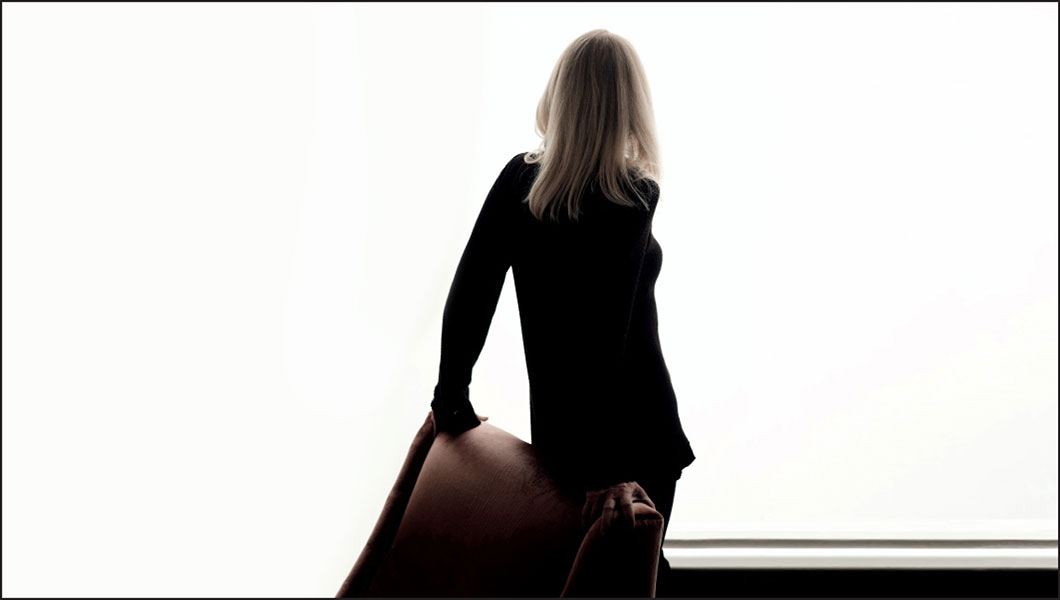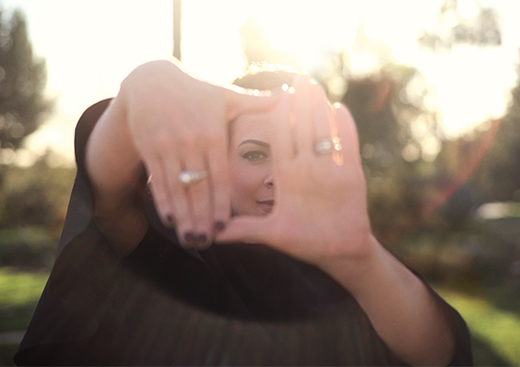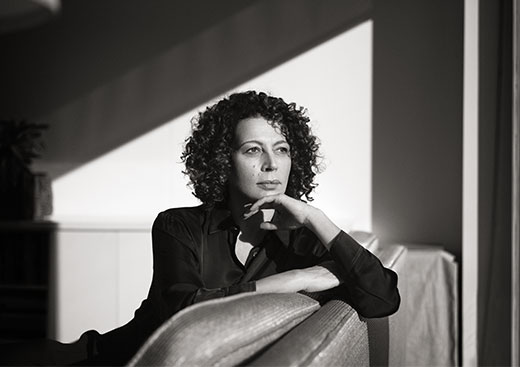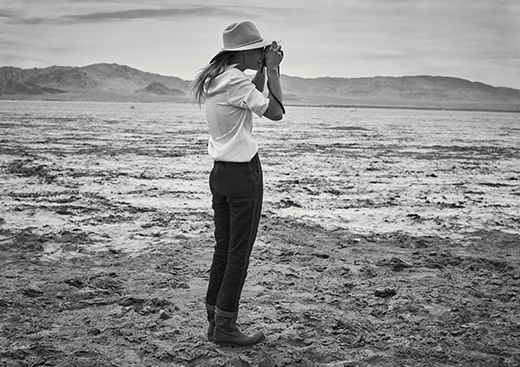KATE BOSWORTH: What makes you curious?
MARTHA RADDATZ: Almost everything. Truly. Curiosity is at the core of my personality and my job. Disciplined curiosity. But most of all I am intrigued by secrets. Everybody has them.
KB: What is important to you?
MR: Family, of course. But also kindness, energy and determination.
KB: How did you arrive here?
MR: The scenic route. Many wrong turns. Many spectacular views along the way. I just keep it in drive.
KB: Did you have a mentor?
MR: There were not a lot of women in positions of power or influence around me when I first started my career. There were men who were very helpful, but not all of them with the purest of motives. When I made it to the network, Diane Sawyer and Robin Roberts were both extremely welcoming and generous with their time. My first few years at ABC News were not and they championed me every step of the way.
KB: What is it about conflict that intrigues you?
MR: It is the step when all else has failed. It is when human beings have to lay it all on the line. The darkest hearts are revealed, and the purest courage.
KB: Conflict has led you to war time—what is that experience like, so close to life and death?
MR: It is intimate and gritty. There are few words spoken at the time. A shared jolt. You just know.
KB: Is there anything that haunts you?
MR: There is so much. From famine-ravaged mothers chasing our truck in Ethiopia begging us to take their starving babies to a combat support hospital in Baghdad where limbs and lives were lost—those memories will always be with me. They are part of who I am and have made me a better person and a better reporter.
KB: If you could have a spirited conversation with anyone, dead or alive, who would it be?
MR: There are 125 stars carved into the Memorial Wall at CIA Headquarters. No names. It’s classified. All died without the rest of the world knowing what they did and how they sacrificed.
KB: What inspires you to take on a story? Is there a spark or a lightbulb moment?
MR: It all comes back to people. How they got to where they are, no matter what the circumstances. That can be war or a city council meeting. What motivates them, how do they survive? I know that when I started reporting on the 2004 Sadr City battle, the lightbulb went off when I interviewed Staff Sergeant Robert Miltenberger. A soldier who you would think was the toughest guy around broke down and cried. I had never seen a soldier cry. And had never seen such emotional pain from battle. I have been clawing at his big, sore heart to find out more ever since that. I consider him a dear friend.
KB: Do you ever think of consequences when breaking a story?
MR: Absolutely. I think every reporter should. It helps you realize the enormity of your responsibility.
KB: What made you decide to be involved in journalism?
MR: I have always been a big reader, and nothing has influenced me more—I think reading saved me. I was obsessed with a few female authors, among them Louise Erdrich, Joan Didion, Nora Ephron, Mona Simpson and a woman who came from my hometown, Terry Tempest Williams. (I also thought that was about the coolest name on the planet.) I am a huge Wallace Stegner fan as well. I was (and still am) dazzled by their brains, their depth and their cool. As for journalism, I never really decided on what I wanted to do (thus the scenic route I mentioned before!). I fell into it and as with reading, I realized I learned something every day.
KB: What gets you up in the morning?
MR: A new day. A new opportunity. I rarely sleep late because I am afraid I will miss something.
KB: What inspires you, personally and/or professionally?
MR: Creativity. Courage. Strength. Danger. Depth. Surprise. Unanswered questions. Anything outside of “conventional wisdom.”
KB: Is there a person or event that impacted who you are today?
MR: My life is a blender of events and people who influenced me both negatively and positively. Number one in the negative column is bitterness. I have seen it so often. It is destructive and unattractive. I will never be bitter. And the list of positive influences—creative, vibrant souls who contribute in some way every day is a powerful motivator to me.
KB: How much doubt versus faith do you use in a percentage of a day?
MR: I hadn’t contemplated before how narrow the line between them. But I easily come down on the side of faith over doubt. It is a more optimistic way to live. And I consider myself an optimist.
KB: How do you feel being one of the leaders in journalism?
MR: I don’t see myself that way, but I know others do. I think about that a lot. Especially when it comes to young women. I am deeply flattered when young women say they look up to me. It is also a profound responsibility. I want to do right by them.
KB: What questions do you ask yourself that you would never ask anyone else?
MR: Oh yes, but they are so personally critical they would not apply to others. Nor would I say them out loud.
KB: Is there a failure that later became a success or vice versa?
MR: As a very young reporter I got something wrong on the air. There was no one else who challenged me or questioned how I had gotten the information, and there were no consequences. I really had no idea what I was doing. But I knew later that I had gotten it wrong and I figured out how it happened and learned an important lesson.
KB: Do you have fear?
MR: Oh yes, all kinds of fears. We all do. The key is managing and overcoming your fears. In fact, being “fearless” is not a good thing. In the military there is a term for that, a NAFOD—which means “no apparent fear of death.” The military does not want those people. They will get you hurt.
KB: What words do you have for anyone aspiring to be a journalist?
MR: It is not about you. It has to be a passion to learn about the world, to learn about others and tell their stories. And find your soul. The best journalists have a soul. It is pure bullshit to think journalists should somehow not “feel.”
KB: If there was a headline for your life, what would it be?
MR: I would hope it would say I wasn’t ordinary. And that I am grateful to have seen crevices of the world that few will see, and met extraordinary people.
KB: You’ve traveled around the world numerous times and seen war up close and personal. You have moderated presidential debates, revealed groundbreaking stories, and you live in the nation’s capital, asking the toughest, most sincere questions—now I have one for you: What’s going on?
MR: Oh man, that is a tough one. It is right up there with “What is the meaning of life?” One day I think I know what is going on and the next I have no idea. No matter how much I have done and how much I have seen, I am surprised almost every day by the world’s complexity—the joy some people bring to the planet and the hatred and evil in which others seem to delight. Perhaps the answer is “None of us really know.”
KB: What has been a great accomplishment for you?
MR: Personally it is raising two children who are happy, kind and define their own success. Professionally, there was no greater challenge than doing the general election debates. I have explained to people it is like studying for the SATs and taking them in front of 60 million people. But the project that makes me the proudest is the Nat Geo miniseries based on my book The Long Road Home. The amount of talent poured into that project (YOU Kate!) was breathtaking. The best part of the project is knowing that for many of those involved in the real-life battle, the mini series was healing. That gives me great comfort and pride. I know I will have lifelong, meaningful friendships because of that project. It was life changing.
KB: What goals would you like to accomplish in the future?
MR: To be better at everything I do. I know my weaknesses and I want to improve. And writing books can be a miserable yet rewarding experience. Despite the misery, I want to write another book.
KB: Would you run for president?
MR: Ha! Would not even consider it, nor would anyone in their right mind want me to.
KB: What does a Citizen of Humanity mean to you?
MR: It starts with empathy. We are hand in hand even though oceans apart. We live better, richer lives if we work together for the good of all.
—





